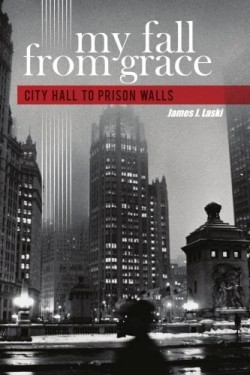My Fall From Grace
City Hall to Prison Walls
Tell some people from Chicago that Mayor Richard M. Daley’s political machine takes ten percent off the top and their reply will probably be something along the lines of “So what? This is the best-run city in the country!” A citizen of Boston might envy them.
Even former Chicago City Clerk James Laski admits that Daley gets things done very well but he gives us his view of the way those things get done in the Second City. It’s not pretty.
Laski tells little of his early life growing up on the city’s southwest side. The story begins when he asks his precinct captain to get him a job on the city payroll. After several years Daley named him alderman of the 23rd Ward.
“Unfortunately” Laski writes “in Chicago politics very seldom—or never—will the mayor just appoint a new alderman without someone with clout having first given the mayor his or her blessing in exchange for future appointment privileges from that office. I was certainly no exception to this rule.”
From here Laski shows readers how the mayor runs the city. Daley is always involved; loyalty is vital and it pays off in plums—contracts to do the city’s work jobs for favorites special permits whatever the city can do. Preferred people make money but they get the jobs done.
With Daley’s blessing Laski finally won the powerful position of City Clerk. Like all the other politicians he traded favors and rewarded anyone who did a favor for the Daley administration or for him. Unfortunately he got too ambitious and he describes in great detail his “fall from grace” which involved bribery—not big bribes just small ones.
The middle of the book deals with the “Hired Truck Crisis.” Truckers took turns doing jobs for the city and making money. They got those jobs in the usual way—except sometimes when they got them for hard cash. When the FBI got involved Laski was sentenced to two years in the federal prison at Morgantown West Virginia.
Laski describes his stay in prison as a harrowing experience like something out of a bad movie. According to him every person who worked in that prison including the Catholic chaplain treated the inmates like dirt. The warders served execrable food; they provided dismally ineffective medical care; they ran utterly sadistic alcohol and drug rehab programs.
Anyone who reads a memoir must of course be aware that the writer probably will see things in a way a disinterested source might not and Laski though he accepts his guilt and asks God for forgiveness may have slanted his tale to gain sympathy. Still readers shouldn’t be surprised if there’s a good deal of truth in this book. Some of his description of prison life would be hard for anyone to make up. Laski tells his story well though the detail gets thick sometimes.
Reviewed by
Carter Jefferson
Disclosure: This article is not an endorsement, but a review. The publisher of this book provided free copies of the book and paid a small fee to have their book reviewed by a professional reviewer. Foreword Reviews and Clarion Reviews make no guarantee that the publisher will receive a positive review. Foreword Magazine, Inc. is disclosing this in accordance with the Federal Trade Commission’s 16 CFR, Part 255.

